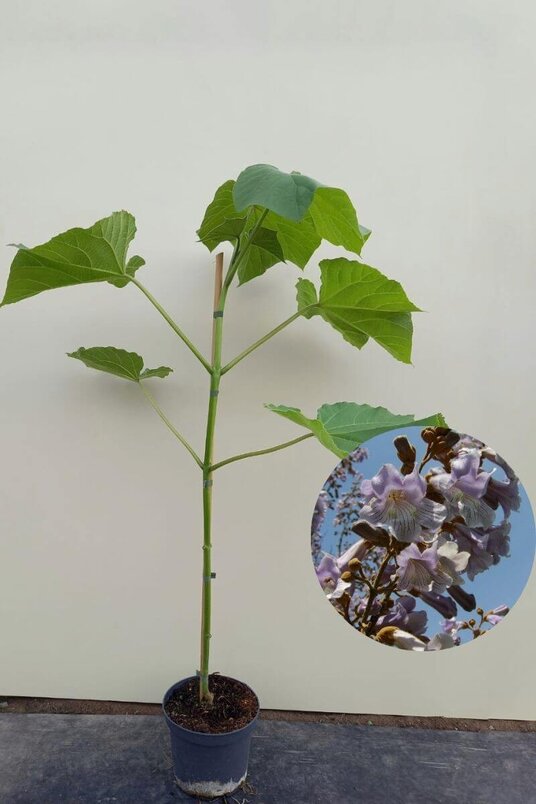Young Anna Paulowna tree | Paulownia tomentosa
Lilac-blue flower plumes that can grow up to 30 cm in size and leaves that can reach up to 70 cm? These are both characteristics of the Paulownia tomentosa, also known as the Anna Paulowna tree.
Discount!
- Quantity Discount Per piece
- -10% €53,78 Incl. VAT
Guaranteed damage-free delivery
Free shipping from €150,- (International)
Can be planted throughout the year
The Paulownia tomentosa
The Paulownia tomentosa, also known as the Anna Paulowna tree or Empress tree, is an impressive sight. Its beautiful lavender-colored flowers in spring make it a popular choice for gardeners.
Flowering
Characteristic of the Anna Paulowna tree are the lilac-blue flowers, which bloom in clusters on the tree before the leaves appear. These flower clusters consist of several small flowers that bloom in a pendulous manner within the cluster.
Leaf Shape and Color
After flowering, the Anna Paulowna tree grows green leaves, which can grow up to 70 cm in size. These leaves add to the beauty of the tree and are a striking feature of this beautiful Paulowna tree.
Seed Pods
On the faded flower clusters, the characteristic seed pods of the Paulownia tomentosa appear. These serve as a food source for many different birds. The presence of birds in your garden, attracted by the Anna Paulowna tree, offers a beautiful natural view.
Growth Habit
The Paulownia tomentosa is known as a very fast-growing tree species. With its strong growth potential, it quickly reaches impressive heights. This characteristic makes it popular among gardeners and landowners seeking rapid results in the landscape.
Location
The Paulownia tomentosa thrives best in a sheltered location with nutrient-rich soil. This preference makes it a favorite choice for gardeners striving for optimal growth conditions for this beautiful tree.
Moderately Wind-Resistant
Due to its fast growth, the Paulownia tomentosa is moderately resistant to wind, so it is advisable to plant it in a sheltered location to prevent damage.
How to plant the tree?
- Determine the final location of the tree and ensure that it is free from cables, debris, old plants, and other things that could hinder the tree's growth.
- Dig a planting hole that is twice the width of the root ball. Loosen the soil at the bottom of the planting hole and mix the excavated soil with (organic) garden soil or planting mix.
- Place the planting hole at a height where the root ball fits and firmly press the soil.
- Fill the planting hole with water and wait for it to drain. Check if the root ball is sufficiently moist.
- Place the tree or plant in the planting hole. It is extremely important that the tree is not planted too deep, as this can cause root rot.
- Place a tree stake or bamboo stake firmly in the ground on the side of the tree where the most wind comes from.
- Now, place the watering ring or create a small mound of soil around the tree so that water can seep into the soil.
Why Choose a Young Tree from Amitis
- Easy to plant yourself due to the compact size and light weight
- Conveniently delivered to your home in a sturdy packaging
- Experience the growth and development of your own tree
- Easy to maintain
- Cultivate the size and growth form you are looking for
- Attain mature size within a short time
- Can be planted year-round as everything is delivered in pots
- No root loss and better chances of establishment as everything is pot-grown
- Cost-effective purchase
- Fresh, healthy plants directly from the grower
Questions?
Want to know more about pruning? Read our page on tree maintenance! Feel free to contact us; we are happy to assist!
Specifications
-
Flower color
Lila-Blue -
Flowering months
May-June -
Location
Sun semi-shade -
Fruits
Seed pods -
Evergreen
Not evergreen -
Winter hardiness
Highly winter-hardy, moderately winter-hardy when young -
Leaf color in summer
Green -
Leaf color in autumn
Yellow
Reviews(2)
- Add your review
-
-
-
"De tweede bestelling, weer netjes afgeleverd en mooie bomen!"
-
- Harold Lam
-
-
-
-
"Kwalitatief goede planten zijn bezorgd, voor een goede prijs."
-
- Jan Willem van Prooijen
-












